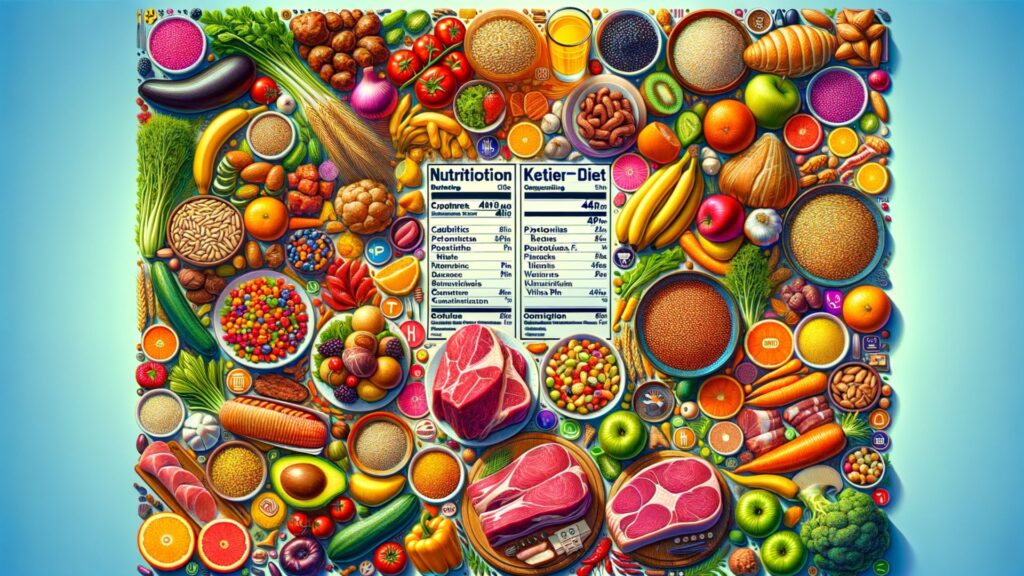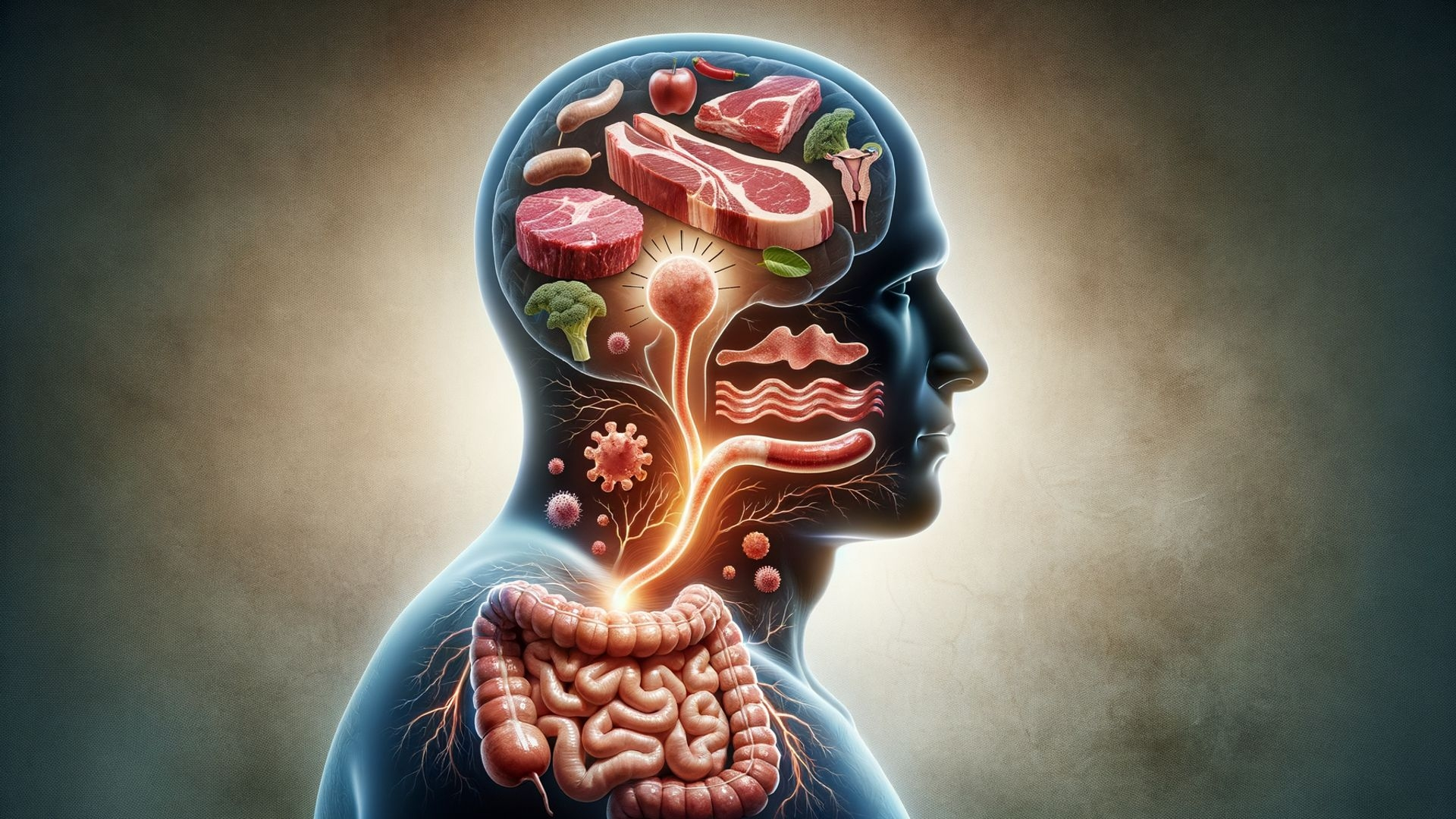Diet Comparison: Carnivore Diet vs. Keto for Nutritional Insights
When it comes to exploring different dietary approaches to achieve optimal health and wellness, the Carnivore Diet and the Keto Diet have gained significant popularity in recent years. These two diets have distinct principles and nutritional focuses, each claiming to offer unique benefits for individuals seeking to improve their overall well-being.
In this comprehensive analysis, we will delve into the specifics of the Carnivore Diet and the Keto Diet, comparing their nutritional contents, health implications, and potential risks.
What is the Carnivore Diet?
The Carnivore Diet, also known as an all-meat diet, is a dietary regimen that primarily consists of animal products, with a focus on consuming meat while excluding plant-based foods. Followers of the Carnivore Diet adhere to a zero-carb approach, eliminating carbohydrates and relying solely on animal-derived sources for their nutritional needs.
Proponents of the Carnivore Diet claim that it can lead to improvements in various health markers, including weight loss, better digestion, increased energy levels, and reduced inflammation. Some individuals also report relief from autoimmune conditions, joint pain, and skin issues when following this diet.
However, critics of the Carnivore Diet argue that it lacks essential nutrients that are primarily found in fruits, vegetables, and whole grains. They also express concerns about the long-term effects of consuming high amounts of saturated fat and cholesterol, which are commonly found in animal products.
It is important to note that the Carnivore Diet is a restrictive eating plan and may not be sustainable or suitable for everyone. It is recommended to consult with a healthcare provider or a registered dietitian before making significant changes to your diet to ensure that your nutritional needs are being met.
Understanding the Basics of the Carnivore Diet
The Carnivore Diet is characterized by its emphasis on animal products, such as meat, fish, and poultry, while excluding plant-based foods like fruits, vegetables, grains, and legumes. This diet promotes the consumption of nutrient-dense animal products as the cornerstone of one’s daily meals. T
he main premise of the Carnivore Diet is that humans evolved to thrive on animal foods, and that a diet based solely on animal products can promote health and well-being. Supporters of the Carnivore Diet claim that eating only animal foods can lead to weight loss, improved digestion, reduced inflammation, and increased energy levels.
Proponents of the Carnivore Diet argue that plant-based foods contain anti-nutrients and toxins that can be harmful to the body, and that a diet focused on animal products provides all the necessary nutrients for optimal health. They believe that by eliminating plant foods from the diet, the body can more easily digest and absorb nutrients, leading to better overall health.
Critics of the Carnivore Diet argue that excluding plant foods can lead to nutrient deficiencies, particularly in important vitamins and minerals like vitamin C, fiber, and antioxidants. They also raise concerns about the potential long-term health effects of a diet high in animal products, particularly in terms of heart health and cancer risk.
Key Nutrients Emphasized in the Carnivore Diet
Proponents of the Carnivore Diet argue that animal products provide essential nutrients such as protein, omega-3 fatty acids, and various vitamins and minerals crucial for overall health. Meat and dairy products are considered vital sources of nutrients in this dietary plan.
Additionally, supporters of the Carnivore Diet argue that eliminating carbohydrates and plant-based foods can lead to improved digestion, reduced inflammation, and weight loss. They claim that consuming only animal products can help regulate blood sugar levels and improve energy levels, as well as promote mental clarity and focus.
Some proponents also argue that the Carnivore Diet can benefit individuals with autoimmune diseases, digestive issues, and other health conditions by eliminating potential triggers found in plant-based foods. They believe that reducing or eliminating plant-based foods can help reduce symptoms and improve overall health in these individuals.
Overall, proponents of the Carnivore Diet believe that prioritizing animal products in the diet can provide essential nutrients and promote overall health and well-being.
Potential Health Benefits of the Carnivore Diet
Supporters of the Carnivore Diet claim that following this eating pattern may lead to weight loss, improved blood sugar control, and reduced inflammation in the body. Additionally, some individuals report experiencing increased energy levels and mental clarity while on the Carnivore Diet.
Some studies have suggested that consuming a high-protein diet, like the Carnivore Diet, can aid in weight loss by increasing feelings of fullness and reducing overall calorie intake. This can be beneficial for those looking to shed excess pounds or improve body composition.
In terms of blood sugar control, the elimination of carbohydrates on the Carnivore Diet may help stabilize blood glucose levels and reduce insulin resistance, a factor in the development of type 2 diabetes. Some individuals with diabetes have reported improved glycemic control while following a low-carb, high-protein diet like the Carnivore Diet.
Additionally, proponents of the Carnivore Diet argue that by eliminating potentially inflammatory foods like grains, legumes, and dairy, individuals may experience reduced inflammation in the body. Chronic inflammation is linked to a variety of health issues, including heart disease, arthritis, and autoimmune disorders, so reducing inflammation through diet could have a positive impact on overall health and well-being.
What is the Keto Diet?
The Keto Diet, short for the Ketogenic Diet, is a low-carbohydrate, high-fat dietary approach designed to induce a state of ketosis in the body. Ketosis occurs when the body shifts from using glucose as its primary fuel source to burning fat for energy, resulting in the production of ketones.
In the keto diet, individuals drastically reduce their intake of carbohydrates, typically to less than 50 grams per day, and increase their consumption of healthy fats and moderate amounts of protein. This shift in macronutrient consumption helps the body enter ketosis, where it starts burning stored fat for fuel instead of relying on glucose from carbohydrates.
This can lead to rapid weight loss and improved markers of metabolic health, such as lower blood sugar levels, reduced inflammation, and improved cholesterol profiles. The keto diet has also been shown to be effective in helping to manage conditions such as epilepsy, type 2 diabetes, and polycystic ovary syndrome (PCOS).
However, the keto diet is not without its drawbacks. Some individuals may experience side effects such as fatigue, headaches, and constipation when first starting the diet, commonly referred to as the “keto flu”. It may also be challenging to sustain the restrictive nature of the diet long-term, as it limits many food groups that are typically considered healthy, such as fruits, whole grains, and legumes.

Exploring the Fundamentals of the Keto Diet
The Keto Diet focuses on moderate protein intake, high fat consumption, and minimal carbohydrates. By drastically reducing carbohydrate intake, the body enters a metabolic state where fat becomes the primary source of energy, leading to weight loss and other potential health benefits.
Some potential benefits of the Keto Diet include:
1. Weight loss: By reducing carbohydrate intake, the body burns fat for energy, leading to weight loss. Many individuals have reported significant weight loss while following the Keto Diet.
2. Improved blood sugar control: By limiting carbohydrate intake, blood sugar levels are stabilized, which can be beneficial for individuals with diabetes or insulin resistance.
3. Increased energy levels: With fat being the primary source of fuel, many individuals report increased energy levels and reduced fatigue while following the Keto Diet.
4. Improved mental clarity and focus: Some individuals report improved cognitive function and mental clarity while following the Keto Diet, which may be attributed to the stable
blood sugar levels and decreased inflammation.
5. Reduced inflammation: The Keto Diet has been shown to reduce inflammation in the body, which can lead to improved overall health and a reduced risk of chronic diseases.
While the Keto Diet has many potential benefits, it is not suitable for everyone. It is important to consult with a healthcare professional before starting any new diet, especially if you have pre-existing health conditions or are taking medications.
Additionally, it is important to ensure that you are still meeting your nutritional needs while following the Keto Diet, as it may be deficient in certain vitamins and minerals if not followed properly.
Differences in Macronutrient Distribution in Keto vs. Carnivore Diet
While both the Carnivore Diet and the Keto Diet are considered low-carb diets, they differ in their macronutrient compositions. The Keto Diet typically involves a specific ratio of macronutrients, with a higher emphasis on fat intake and moderate protein consumption, whereas the Carnivore Diet allows for more unrestricted protein intake.
Additionally, the Carnivore Diet is more restrictive in that it only allows for animal-based foods, such as meat, fish, and eggs, while the Keto Diet allows for a wider variety of foods, including low-carb vegetables, nuts, and dairy.
In terms of health benefits, both diets have been claimed to promote weight loss, improve blood sugar control, and provide mental clarity and increased energy levels. However, the Carnivore Diet may be more challenging to sustain long-term due to its extreme restrictions and potential lack of essential nutrients found in plant-based foods.
It is important to consult with a healthcare provider or nutritionist before starting any new diet, especially one as restrictive as the Carnivore Diet, to ensure that you are meeting your nutritional needs and maintaining overall health and well-being.
Health Implications of Sustaining the Keto Diet Long-Term
Long-term adherence to the Keto Diet may offer benefits such as improved insulin sensitivity, weight management, and possibly reduced risk of certain diseases. However, concerns exist regarding potential nutrient deficiencies and the sustainability of the Keto Diet over extended periods.
The Keto Diet is a high-fat, low-carb diet that aims to put the body into a state of ketosis, where it burns fat for fuel instead of carbohydrates. While there is evidence to suggest that the Keto Diet can be effective for weight loss and improving certain health markers, such as blood sugar levels and cholesterol, there are also potential drawbacks to consider.
One concern with the Keto Diet is that it can be difficult to maintain over the long term. This is because the diet requires strict adherence to a specific macronutrient ratio, which may be challenging for some people to sustain for an extended period.
Additionally, the restrictive nature of the diet can make it difficult to follow in social situations or when eating out, which may lead to feelings of isolation or restriction.
Another potential concern with the Keto Diet is the risk of nutrient deficiencies.
Because the diet restricts certain food groups, such as fruits, grains, and legumes, it can be challenging to get all of the essential nutrients that the body needs to function optimally.
For example, deficiencies in vitamins and minerals like vitamin C, fiber, and potassium are common on the Keto Diet, which can have negative effects on overall health and well-being.
Comparing Nutritional Contents
When comparing the nutrient profiles of the Carnivore Diet and the Keto Diet, it is essential to evaluate the availability of essential nutrients and the potential for deficiencies in each dietary approach. Both diets have unique nutritional characteristics that can impact overall health outcomes.
The Carnivore Diet is a restrictive diet that focuses solely on animal-based foods such as meat, fish, and animal fats. This diet is extremely low in carbohydrates and excludes all plant-based foods, including fruits, vegetables, grains, and legumes. While animal foods are rich in protein, vitamins B12 and D, and minerals like iron and zinc, they may lack certain nutrients found in plant-based foods, such as fiber, antioxidants, and phytonutrients.
On the other hand, the Keto Diet is a low-carbohydrate, high-fat diet that allows for a wider variety of foods, including meats, dairy, nuts, seeds, non-starchy vegetables, and some fruits. This diet emphasizes healthy fats like avocados, nuts, and olive oil and restricts carbohydrates to encourage the body to enter a state of ketosis, where it burns fat for fuel.
While the Keto Diet can provide a more diverse array of nutrients compared to the Carnivore Diet, it may be lower in certain vitamins and minerals like potassium and magnesium if not consumed in adequate amounts.
Both diets have potential benefits and drawbacks, and individuals should consider their personal health goals and preferences when choosing between the Carnivore Diet and the Keto Diet. It is important to ensure adequate nutrient intake and consider consulting with a healthcare provider or registered dietitian to prevent deficiencies and optimize overall health on either dietary approach.

Examining the Nutrient Profiles of Carnivore and Keto Diets
The Carnivore Diet places a significant emphasis on animal-derived foods rich in protein, essential vitamins, and minerals. In contrast, the Keto Diet focuses on high-fat sources like avocados, nuts, seeds, and oils, along with adequate protein intake to support ketosis. Both diets have gained popularity for their potential benefits in weight loss, energy levels, and overall health. However, the Carnivore Diet limits carbohydrate intake to zero, while the Keto Diet allows for a moderate amount of carbohydrates, typically around 20-50 grams per day.
While the Carnivore Diet may provide quick weight loss results due to its strict restriction of food groups, some critics argue that it lacks balance and may lead to deficiencies in certain nutrients like fiber, vitamins C and E, and phytonutrients found in plant-based foods. On the other hand, the Keto Diet allows for a more varied diet with the inclusion of plant-based foods, which can be beneficial for overall health and nutrition.
It’s important to note that both diets may not be suitable for everyone and consulting a healthcare provider or nutritionist before making significant dietary changes is recommended. Additionally, listening to your body’s needs and finding a sustainable way of eating that works for you is key to long-term success in reaching your health and wellness goals.
Assessing Potential Nutrient Deficiencies in Carnivore and Keto Diets
While the Carnivore Diet provides ample protein and certain nutrients found in animal products, it may lack essential nutrients typically obtained from plant-based foods, such as fiber, vitamin C, and phytonutrients. On the other hand, the Keto Diet may result in deficiencies in specific vitamins and minerals due to restricted food choices.
Overall, both diets may have their own nutritional shortcomings if not carefully planned and balanced. It is important to consider individual health needs and work with a healthcare provider or nutritionist to ensure any dietary restrictions are met while still obtaining all necessary nutrients for overall health and well-being.
Impact on Blood Sugar and Cholesterol Levels in Both Diets
Both the Carnivore Diet and the Keto Diet have shown potential benefits in regulating blood sugar levels and improving cholesterol profiles for some individuals. However, the long-term effects of these diets on metabolic health and cardiovascular risk factors require further research and monitoring.
Additionally, while the Carnivore Diet emphasizes animal products and restricts plant-based foods, the Keto Diet allows for a broader range of food options, including non-animal sources of fat and protein. This can make the Keto Diet more sustainable and easier to follow for some individuals.
It’s important to note that both diets can be restrictive and may not provide all the essential nutrients necessary for long-term health. Consulting with a healthcare provider or registered dietitian before starting either diet is recommended to ensure that nutritional needs are being met.
Ultimately, the best diet for an individual will depend on their specific health goals, preferences, and medical history. It’s important to focus on a balanced and varied diet that provides all the necessary nutrients for overall health and well-being.
Health Benefits and Risks
Exploring the impacts of the Carnivore Diet and the Keto Diet on various aspects of health, including heart health, gut health, and the risk of developing conditions like type 2 diabetes, can provide valuable insights into the overall health implications of these dietary patterns. Both the Carnivore Diet and the Keto Diet are high in fat and protein, with a significant reduction in carbohydrates.
The Keto Diet specifically aims to put the body in a state of ketosis, where it burns fat for fuel instead of carbohydrates. The Carnivore Diet, as the name suggests, consists primarily of animal products like meat and dairy, with little to no plant-based foods.
In terms of heart health, both diets have shown mixed results. While some studies suggest that the high fat content of these diets can raise cholesterol levels and increase the risk of heart disease, other research has shown improvements in markers of heart health, such as reduced inflammation and improved blood pressure.
Gut health is another important aspect to consider when evaluating the impact of these diets. The lack of fiber and diversity of nutrients in the Carnivore Diet can potentially lead to imbalances in the gut microbiome, which is crucial for overall health. On the other hand, the Keto Diet may also have an impact on gut health due to changes in the types of bacteria present in the gut.
When it comes to the risk of developing type 2 diabetes, both diets have shown promise in improving insulin sensitivity and blood sugar levels. The Keto Diet, in particular, has been shown to be effective in managing blood sugar levels and reducing the risk of developing diabetes.

Exploring the Impacts on Heart Health in Carnivore and Keto Diets
The consumption of animal products high in saturated fats in the Carnivore Diet may raise concerns about cardiovascular health, while the Keto Diet’s potential to improve lipid profiles and weight management could offer cardiovascular benefits. Balancing dietary fats and cholesterol intake is crucial for heart health in both diets.
It is essential to consider the quality of the fats consumed in each diet and opt for healthy fats like omega-3 fatty acids found in fish, nuts, and seeds. Including a variety of nutrient-dense foods such as vegetables, fruits, and whole grains can also support heart health by providing essential vitamins, minerals, and antioxidants.
Additionally, incorporating regular physical activity, managing stress levels, and avoiding smoking can further enhance cardiovascular health regardless of the specific diet followed. Consulting with a healthcare provider or a registered dietitian can help personalize dietary recommendations and address any concerns related to heart health when following the Carnivore or Keto Diet.
Potential Effects on Gut Health and Type 2 Diabetes Risk
Gut health plays a critical role in overall well-being, and the exclusion of fiber-rich plant foods in the Carnivore Diet may impact gut microbiota diversity and function. On the other hand, the Keto Diet’s potential to reduce inflammation and support blood sugar control may influence the risk of developing type 2 diabetes.
Therefore, it is important to consider the potential impacts on gut health and overall health when choosing between the Carnivore Diet and the Keto Diet. It may be beneficial to incorporate a variety of nutrient-dense foods, including fiber-rich plant foods, into your diet to support gut health and overall well-being.
Additionally, consulting with a healthcare provider or registered dietitian can help guide you in making the best dietary choices for your individual health needs.
Considering the Overall Health Implications of Carnivore vs. Keto Diet
Understanding the potential benefits and risks associated with the Carnivore Diet and the Keto Diet is essential for making informed dietary choices. It is crucial to consider individual health goals, preferences, and medical conditions when deciding which dietary approach to follow for long-term health and well-being.
Both the Carnivore Diet and the Keto Diet have gained popularity for their potential benefits in weight loss, improved energy levels, and blood sugar control. However, they also come with potential risks that must be taken into consideration.
The Carnivore Diet, which focuses on consuming only animal products and excludes all plant-based foods, may provide benefits such as increased protein intake, improved satiety, and potential relief from digestive issues for some individuals.
However, it may also lead to nutrient deficiencies, as certain essential vitamins and minerals are primarily found in plant-based foods. Additionally, the high intake of saturated fats and cholesterol from animal products may increase the risk of heart disease and other chronic health conditions.
On the other hand, the Keto Diet, which focuses on high-fat, moderate-protein, and low-carbohydrate intake, may help in weight loss, improved blood sugar control, and increased mental clarity for some individuals. However, it may also lead to nutrient deficiencies if not followed carefully, as the restriction of certain food groups, such as fruits and whole grains, may limit the intake of essential vitamins and minerals.
Practical Considerations and Recommendations
Addressing nutritional gaps, evaluating the long-term viability and risks, and providing guidelines for incorporating a balanced mix of animal products and plant-based foods are key considerations when following the Carnivore Diet or the Keto Diet.
The Carnivore Diet, which focuses on consuming only animal products, may lead to potential nutritional deficiencies in essential vitamins and minerals found in plant-based foods. It is important to ensure that individuals following this diet are receiving adequate amounts of micronutrients like Vitamin C, fiber, and antioxidants, which are usually found in fruits, vegetables, and grains.
On the other hand, the Keto Diet, which emphasizes high fat, moderate protein, and low carbohydrate intake, may also have potential risks and challenges. While this diet can be effective for weight loss and managing certain health conditions like epilepsy and PCOS, it can be difficult to sustain in the long term and may lead to nutrient deficiencies if not carefully planned. It is important to include a variety of plant-based foods like low-carb vegetables, nuts, and seeds to ensure a balanced and nutritious diet.
To address these concerns, individuals considering either the Carnivore Diet or Keto Diet should consult with a healthcare provider or registered dietitian to evaluate their current nutritional status and create a personalized plan that meets their individual needs.
Incorporating a mix of animal products and plant-based foods can help provide a well-rounded diet that includes essential nutrients and supports overall health and wellbeing. Additionally, monitoring for any potential side effects or adverse reactions while following these diets is crucial to ensure long-term viability and success.
Addressing Nutritional Gaps in Carnivore and Keto Diets
Supplementing with essential nutrients that may be lacking in the Carnivore Diet, such as vitamin C and fiber, can help prevent deficiencies and support overall health. Similarly, individuals following the Keto Diet should focus on nutrient-dense foods to meet their daily vitamin and mineral requirements.
Some supplements that may be beneficial for individuals following these diets include:
1. Vitamin C: Since fruits and vegetables are limited on the Carnivore Diet, supplementing with Vitamin C can help prevent deficiencies. Vitamin C is crucial for immune function, collagen production, and overall health.
2. Fiber: The Carnivore Diet is low in fiber, which can lead to constipation and digestive issues. Adding a fiber supplement or including small amounts of fiber-rich foods like avocado or nuts can help support gut health.
3. Electrolytes: The Keto Diet can cause electrolyte imbalances due to increased fluid loss. Supplementing with magnesium, potassium, and sodium can help prevent fatigue, muscle cramps, and headaches.
4. Omega-3 fatty acids: While fatty fish is allowed on both diets, supplementing with Omega-3s can help balance Omega-6 intake and reduce inflammation.
5. Multivitamin: A high-quality multivitamin can help fill in any nutrient gaps and ensure you are meeting your daily requirements for essential vitamins and minerals.
It’s important to consult with a healthcare provider or registered dietitian before starting any new supplement regimen to ensure they are safe and appropriate for your individual needs.
Guidelines for Balancing Animal Products and Plant-Based Foods in Diets
Integrating a variety of nutrient-rich animal products and plant-based foods into one’s diet can help optimize nutrient intake and promote overall health.
Following a flexible approach that combines the benefits of both animal and plant-based sources can offer a balanced and sustainable dietary strategy.
By combining animal and plant-based foods in one’s diet, one can enjoy the benefits of both worlds and meet all their nutritional needs. Some ways to achieve this balance include:
1. Making half of your plate filled with colorful fruits and vegetables at each meal.
2. Choosing whole grains like brown rice, quinoa, oats, and whole-wheat products for added fiber and nutrients.
3. Including a variety of protein sources such as beans, lentils, tofu, nuts, seeds, and low-fat dairy products.
4. Using plant-based oils like olive oil, avocado oil, and coconut oil for cooking and salad dressings.
5. Incorporating dairy or fortified plant milks for calcium, vitamin D, and other essential nutrients.
6. Enjoying fatty fish like salmon, mackerel, and sardines for omega-3 fatty acids.
7. Moderating intake of red and processed meats while including lean sources like poultry and fish.
8. Being mindful of portion sizes and listening to your body’s hunger and fullness cues.
Ultimately, a balanced and varied diet that combines nutrient-rich animal products and plant-based foods can help improve overall health, support energy levels, enhance immunity, and reduce the risk of chronic diseases. It’s important to listen to your body, enjoy your food, and make choices that align with your individual needs and preferences. Consulting with a registered dietitian or nutritionist can also provide personalized guidance and support in creating a balanced and sustainable dietary plan.
Comparing The Carnivore Diet To Other Popular Diets Frequently Asked Questions:
What is the difference between a carnivore diet and a keto diet?
The main difference lies in the allowed food groups. While the carnivore diet focuses on animal-based products, the keto diet emphasizes a high-fat, low-carb intake.
How does the carnivore diet compare to the Mediterranean diet?
The Mediterranean diet includes a variety of food groups, such as fruits, vegetables, whole grains, and healthy fats, whereas the carnivore diet is focused primarily on animal products.
Can the carnivore diet reduce inflammation?
Some proponents of the carnivore diet claim that it can reduce inflammation due to the elimination of processed foods and carbohydrates, but more research is needed to validate these claims.
What are the differences between the carnivore diet and the Atkins diet?
While both diets are low-carbohydrate, the carnivore diet is a zero-carb approach, primarily consisting of animal products, whereas the Atkins diet allows for more variety and flexibility in food choices.
How does the carnivore diet differ from the paleo diet?
The paleo diet encourages the consumption of whole foods that our ancestors ate, including fruits, vegetables, and lean meats, while the carnivore diet is more restrictive, focusing solely on animal-based products.
Are there any snacks that are suitable for the carnivore diet?
Some options for carnivore-friendly snacks include beef jerky, cheese, hard-boiled eggs, and pork rinds to maintain a high-protein, low-carb intake.
Can the carnivore diet offer any nutritional insights compared to other popular diets?
The carnivore diet offers a unique perspective on nutrition by exploring the effects of eliminating certain food groups and focusing solely on animal products, which can provide insights into the impact of different dietary approaches on health.






